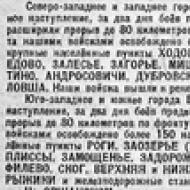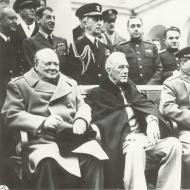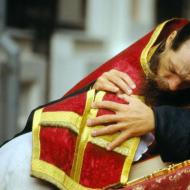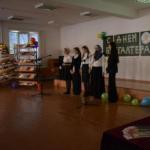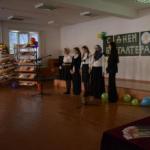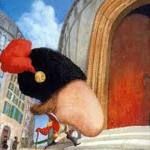
Alexander Romanov - memoirs of Grand Duke Alexander Mikhailovich Romanov. Estate "ai-todor" of Grand Duke A.M.
This year, February 26 marks the 85th anniversary of the death of Grand Duke Alexander Mikhailovich, grandson of Emperor Nicholas I and brother-in-law of the last Russian Sovereign, Emperor Nicholas II. Alexander Mikhailovich went down in history as one of the most extraordinary and, as he called himself, “unlucky” representatives of the Russian Imperial Family. He devoted the first part of his multifaceted life to the Imperial Navy, and shortly before the First World War, he became the founding father of Russian military aviation. Already in emigration, Alexander Mikhailovich shocked many of his compatriots by becoming interested in spiritualism and mysticism, giving lectures on the topic of the afterlife and communication with the souls of the departed.
Alexander Mikhailovich was the fifth child and fourth son in the family of Grand Duke Mikhail Nikolaevich and Grand Duchess Olga Fedorovna, née Princess of Baden. He was born on April 1/13, 1866 in Tiflis, when his father held the position of Viceroy of the Emperor in the Caucasus. Being a gifted and highly educated man, Alexander Mikhailovich (or Sandro, as his relatives and friends often called him in the Georgian manner), decided to connect his life with the fleet. At the age of nineteen, he brilliantly graduated from the Naval School and made his first trip around the world on the corvette Rynda. The Grand Duke was one of the few who tried to take steps to reform the Russian navy, but almost always encountered a solid lack of understanding of the pressing problems of the army at the top of the government. Ultimately, his service was interrupted, and later he briefly headed the Russian merchant fleet, but in the course of behind-the-scenes intrigues he was forced to leave this post.

Grand Duke Alexander Mikhailovich at the age of four

The Grand Duke when he was a cadet at the Naval School
 Vice Admiral of the Russian Imperial Navy Grand Duke Alexander Mikhailovich
Vice Admiral of the Russian Imperial Navy Grand Duke Alexander Mikhailovich
Finding himself in retirement, the Grand Duke did not while away the time on his Crimean estate Ai-Todor and remember the past radiant years. His violent nature, in any life circumstances, looked for a business that would benefit both the state and society. Having learned about the flight of the French aircraft designer Louis Blériot across the English Channel, Alexander Mikhailovich became interested in the idea of developing aeronautics in Russia. Thanks to his energy and enormous efforts, in November 1910, the first aviation school in Russia was opened in Sevastopol, and Alexander Mikhailovich rightfully began to bear the title of chief of the imperial air fleet.

The Grand Duke inspects an aviation school in Sevastopol
Since childhood, he was friends with his cousin and almost the same age as Nicholas II. At the same time, Alexander Mikhailovich met the elder sister of the future Sovereign, Ksenia Alexandrovna, who in 1894 became his wife. They had six stately and handsome sons and one charming daughter. After the revolution, Alexander Mikhailovich lived with his family on his Crimean estate Ai-Todor, where he was placed under house arrest. He also witnessed the occupation of the peninsula by German troops, and then the arrival of former Entente allies in Crimea.

Grand Duke Alexander Mikhailovich with his wife and children

Alexander Mikhailovich and Ksenia Alexandrovna shortly before the February Revolution
The Grand Duke left Russia in December 1918 on board the British cruiser Forsyth. Alexander Mikhailovich hurried to France for the Versailles Conference, where he wanted to speak to leading world leaders so that they would help the White movement and dying Russia. But he never managed to meet anyone, since many believed that the Romanovs were forever thrown to the sidelines of world history.

Alexander Mikhailovich settled in France separately from his wife. Their marriage cracked in the early 1910s, and already in exile he tried to get an official divorce from his wife, but Ksenia Alexandrovna was inexorable and stubbornly continued to observe dynastic decency.
In his declining years, Alexander Mikhailovich began writing memoirs, publishing two books of memoirs. The first was published in 1929 in Paris and was entitled “Once a Grand Duke,” and the second, “Always a Grand Duke,” was published in 1933. When writing his memoirs, Alexander Mikhailovich showed extraordinary literary talent, demonstrating the mastery of artistic expression. His memoirs contain a lot of interesting, unique and mysterious memories of his family, homeland and life in exile. In fact, the memoirs of the Grand Duke are a real bestseller of the House of Romanov, but, alas, it is impossible to completely trust the words and stories of the grandson of Emperor Nicholas I. Sometimes, for the sake of eloquent words or a vivid description of an event, Alexander Mikhailovich used outright rumors and ridiculous speculation, but, in spite of everything, reading these memoirs is quite interesting.

Portrait of Grand Duke Alexander Mikhailovich by Nicholas Zaroquilli. 1920s
Towards the end of his life, he became interested in spiritualism and began to preach the need for a spiritual revolution. A Swiss acquaintance suggested that Alexander Mikhailovich give a lecture on spiritualism in Zurich. Soon a new proposal came for a course of lectures in the USA. The Grand Duke spent three winters in distant America and gave more than sixty lectures, but he was drawn to Europe, closer to his relatives.
 During a tour of the United States with a course of lectures on spiritualism
During a tour of the United States with a course of lectures on spiritualism
Returning from the States, Alexander Mikhailovich settled on his beloved French Riviera. He tried to drown out the difficult memories of the death of his brothers Nika and Georges, who were shot in the Peter and Paul Fortress in 1919, to forget the bloody events of the revolution and the Civil War. Alexander Mikhailovich was one of the first among his numerous relatives to begin to analyze in detail the causes of the disaster that struck Russia in 1917. He thought about his homeland all the time and never stopped hoping for a quick return home. “If we return to Russia, then we will work tirelessly there too; we will have to build our own well-being, there will be no one to expect help from,” the Grand Duke addressed his compatriots. - We must love Russia and the Russian people. Once and for all, we must understand that we can give nothing to the new Russia except love.”
Having finished his second book of memoirs in August 1932, Alexander Mikhailovich unexpectedly fell ill for those around him. He was tormented by terrible back pain. During his illness, he lost a lot of weight and practically did not get out of bed. Doctors diagnosed him with lung cancer in the last stage. Grand Duchess Ksenia Alexandrovna, who hastily arrived from Great Britain, “found a terrible change in Sandro.” Everyone began to understand that Alexander Mikhailovich’s days were numbered. His daughter, Princess Irina Alexandrovna, moved her father to Menton, to the Villa Sainte-Thérèse, which belonged to the princess’s friends, the Chirikov couple, who during the tragic days of house arrest in 1917–1918 were with the Yusupovs in the Crimean estate Koreiz.
Before Ksenia Alexandrovna’s arrival, Irina Alexandrovna, together with Olga Konstantinovna Chirikova, taking turns, selflessly looked after the Grand Duke. “The doctors do not despair at all, although the situation is very serious,” wrote Ksenia Alexandrovna in December 1932 in a private letter. - He needs increased nutrition, but in the absence of appetite and aversion to food, it is difficult to achieve this, and he is tormented when he is begged to eat. In general, it’s very difficult to work with him and you often don’t know which side to approach! Olga Konstantinovna looks after him like an angel, I must say, and with great patience, but she, poor thing, gets hurt endlessly.”

One of the last photographs of Alexander Mikhailovich, taken shortly before his death
On her first visit, Ksenia Alexandrovna stayed in a private boarding house, which was literally a few steps from the Chirikovs’ house. Ksenia Alexandrovna described the reason why she did not settle at the Villa Sainte-Therese in a letter to Alexandra Obolenskaya: “Sandro, having learned about my intention to come, wrote to me that there is no room in the house, although the Chirikovs, of course, will say that there is, but he knows that this will embarrass them and him too.”
In December 1932, Alexander Mikhailovich felt much better, so Ksenia Alexandrovna decided to return to London for the Christmas holidays and spend time with her sons. “The doctors are more satisfied with his general condition, and now it will be easier to do “traitementsérieux” (serious treatment), - wrote the Grand Duchess Alexandra Obolenskaya in Paris. - Last Saturday Sandro took communion and was very pleased, but tired after all the emotions. He called Irina, Olga Konstantinovna and me to his room, and we all prayed together - the priest read prayers before and after communion.”
In February 1933, Ksenia Alexandrovna returned to the south of France, where she found her husband “much more cheerful and better.” Buss’s attending physician was pleased with the patient’s condition, but Alexander Mikhailovich’s appearance did not inspire optimism. “In the morning he lies by the open window in the sun and is even tanned - so far only one cheek,” Ksenia Alexandrovna wrote to her friend Alexandra Obolenskaya. “He’s incredibly thin—it’s painful to watch.”
The denouement of events came very quickly. Everyone understood that the days of the Grand Duke were numbered long ago, but no one expected that death would come for Alexander Mikhailovich so quickly and unexpectedly. On February 25, 1933, Grand Duchess Ksenia Alexandrovna was invited as a guest of honor to the Corps of Pages alumni ball. Returning from the gala event, Ksenia Alexandrovna spent until 11 pm at the bedside of her sick husband. When their only daughter Irina Alexandrovna came to the villa to replace her mother, the Grand Duchess kissed her husband, wished him pleasant dreams and went to the boarding house. As it turned out, this was their last evening together.

At three o'clock in the morning, Alexander Mikhailovich suddenly felt terrible pain in his back. Irina Alexandrovna immediately sent for the doctor and her mother, but she was late. When Ksenia Alexandrovna returned to the villa, her husband died quietly in the arms of her daughter. The doctor who arrived next only stated the fact of his patient’s death.
The next day, all the leading Russian emigrant newspapers in France, Germany and Yugoslavia published on their pages obituaries and memoirs in memory of the late grandson of Emperor Nicholas I. Telegrams with words of condolences from King George V of Great Britain and King Christian of Denmark were sent to Grand Duchess Ksenia Alexandrovna X, King Gustav V of Sweden, Duke Arthur of Connaught and French President Albert Lebrun. Until the end of her days, the Grand Duchess kept these condolences in personal papers and, towards the end of her emigrant life, she often took out these telegrams, yellowed with time, to re-read them and once again remember the years she had lived.

Grand Duchess Ksenia Alexandrovna with her daughter Irina Alexandrovna on the day of her husband’s death
In the main church of the Russian diaspora, in Paris, in the Alexander Nevsky Cathedral on Rue Daru, the next day after the death of the Grand Duke, a solemn memorial service was celebrated, which attracted a large number of worshipers. Members of the House of Romanov, prominent political and military figures of old Russia and the White emigration came to honor the memory of the deceased. The memorial service was celebrated by the famous church figure of the Russian diaspora, Archpriest Georgy Spassky. Before the exclamation of “Eternal Memory,” Father George said a short and profound word in which he clearly outlined the personality of the deceased “Reverend Sovereign and Grand Duke,” recalling his services at the head of the merchant and air fleets, as well as as a representative of the Russian Imperial Family. On the same day, the body of Grand Duke Alexander Mikhailovich was transported from the Villa Saint-Thérèse to the Church of the Blessed Virgin Mary and St. Nicholas the Wonderworker in the city of Menton, where funeral services were performed daily at 11 a.m. and 5 p.m. by the clergy. Every hour, a guard of officers from the Union of Russian Pilots changed at the coffin of the deceased.

Three generations of the family. Grand Duchess Ksenia Alexandrovna with her daughter and granddaughter. The photograph was taken by French reporters at the Villa Sainte-Thérèse on the day of the burial of Grand Duke Alexander Mikhailovich
The funeral of the Grand Duke took place on March 1, 1933. The funeral service in Menton was led by the rector of the church, Archpriest Gregory Lomako. The church was overcrowded with numerous worshipers and could not accommodate everyone. Almost all Russian emigrants then living in the south of France hastened to come to Menton and pay their last respects to the Grand Duke. On the coffin of the deceased lay an officer's cap and sword. Almost all of his children came to Menton to say goodbye to Alexander Mikhailovich, except for his three sons Nikita, Rostislav and Vasily, who lived in the USA at that time. King Christian X and his wife Queen Alexandra arrived from Denmark for the funeral (she was the niece of Alexander Mikhailovich, the eldest daughter of Grand Duchess Anastasia Mikhailovna and Grand Duke Friedrich Franz III of Mecklenburg-Schwerin). The French authorities were represented at the funeral ceremony by the prefect of the Alpes-Maritimes department.

On the day of the Grand Duke's funeral, the streets nearby to the church where the funeral service took place were crowded with Russian emigrants

Even during his lifetime and even before the fall of the monarchy, the Grand Duke managed to draw up a spiritual will, which was approved on August 4, 1914 by Emperor Nicholas II. About his final resting place, Alexander Mikhailovich wrote: “I ask His Imperial Majesty to allow me to be buried in Crimea on my estate in Ai-Todor.” Remembering her husband’s wishes and hoping for a quick collapse of communism in Russia, Grand Duchess Ksenia Alexandrovna believed that her husband’s grave in the south of France would become temporary. The family decided to bury Alexander Mikhailovich in a crypt in the cemetery of the small resort town of Roquebrune-Cap-Martin.

Among the numerous relatives, the King of Denmark and his wife were present at the farewell to Alexander Mikhailovich
At exactly noon, the funeral service in the church ended. The coffin was taken by car to Roquebrune and, after a short funeral service, lowered into the crypt. Later, Grand Duchess Ksenia Alexandrovna, their son Prince Nikita Alexandrovich and daughter-in-law Princess Maria Illarionovna were buried in the same crypt.

Last requiem before burial

Five days after the funeral, already in London in the Russian Church of the Dormition of the Blessed Virgin Mary in Victoria, a memorial service was celebrated for the Grand Duke, which was attended by his grandchildren and the large Russian diaspora. On the same day, a letter from Grand Duchess Ksenia Alexandrovna was published in the next issue of the Russian newspaper “Vozrozhdenie”: “Not being able to write separately to all the people who honored the memory of my husband and from everywhere expressed deep sympathy for our grief, I ask them all to accept my most heartfelt gratitude from me and my children."

The grave of the Grand Duke and his family is located at the very edge of the Roquebrune cemetery. The large Orthodox cross crowning the grave is noticeably different from the other tombstones in the cemetery. From the place where the Grand Duke found his eternal rest, a picturesque and enchanting view of the Mediterranean Sea opens. Somewhere there, far in the East, is Russia and the Crimea, beloved by the Grand Duke, where he dreamed of finding his eternal peace. Will he ever return home to his native Ai-Todor?
@ Ivan Matveev
@ NP "Russian Culture"
Alexander Mikhailovich. Photo from 1896
Alexander Mikhailovich (Sandro), 1866-1933, Grand Duke, son of Grand Duke Mikhail Nikolaevich; adjutant general, admiral, chief manager of merchant shipping and ports (1902-1905), during the war he was in charge of the organization of aviation in the army. He was married to Ksenia, the Tsar's sister. A Mason, he called himself a Rosicrucian and Philalethe. The owner of Ai-Todor in Crimea, where, after the abdication of the Tsar, some members of the imperial family were kept under arrest.
Directory name index Nicholas II's entourage
Alexander Mikhailovich (1866-1933) - Grand Duke, son of Grand Duke Mikhail Nikolaevich, brother of Grand Duke Nikolai Mikhailovich, husband of Grand Duchess Ksenia Alexandrovna, father of Princess of the Blood Irina Alexandrovna. Wing Adjutant (1886), Rear Admiral of the Suite (1903), Vice Admiral and Adjutant General (1909), Admiral (1915). Specialist in the field of shipbuilding, amateur archaeologist and collector. Having received a home education, he was enrolled in the Guards crew and repeatedly made long voyages. Member (1898) and chairman (1900) of the Council for Merchant Shipping Affairs, chairman of the Special Meeting to consider the issue of managing commercial ports (1901), chief manager of merchant shipping and ports (1902-1905), junior flagship of the Black Sea (1903) and Baltic (1905) -1909) fleets. During the First World War - head of the organization of aviation in the armies of the Southwestern Front (1914) and in the entire active army (1915), field inspector general of aviation (1916-1917). Died in exile.
The name index of the book was used: V.B. Lopukhin. Notes of the former director of the department of the Ministry of Foreign Affairs. St. Petersburg, 2008.
Alexander Mikhailovich (Sandro) Romanov(1866-1933) - Grand Duke, Adjutant General, Admiral, Chairman of the Council for Merchant Shipping Affairs (1900-1902), Chief Minister of the Merchant Shipping and Ports Department. During World War I, he was in charge of the aviation unit in the active army. After the revolution - in exile.
Alexander Mikhailovich, Grand Duke (1866-1933) - son of Grand Duke Mikhail Nikolaevich, childhood friend of Nicholas II and his cousin; adjutant general, admiral, since 1900 chairman of the Council for Merchant Shipping Affairs. In 1902-1905 - Chief Manager of Merchant Shipping and Ports. During the First World War, head. aviation unit of the active army
Materials used from the book: "Security". Memoirs of leaders of political investigation. Volumes 1 and 2, M., New Literary Review, 2004.
Alexander Mikhailovich Romanov (1866–1933) - Grand Duke, statesman and military leader, admiral (1915), adjutant general (1909), 4th son of Grand Duke Mikhail Nikolaevich. Married (since 1894) to the daughter of Emperor Alexander III, Xenia. Close friend of Nicholas II. In 1900–1903 commander of the battleship "Rostislav" (Black Sea Fleet), since 1903 junior flagship of the Black Sea Fleet. Supported the creation of the Naval General Staff (1906). Since 1898, member, then chairman of the Council for Merchant Shipping, in 1902–1905. headed the Main Directorate of Merchant Shipping and Ports, created on his initiative. Since 1904, Chairman of the Special Committee for Strengthening the Fleet using voluntary donations, after the end of the Russo-Japanese War of 1904–1905. insisted on the accelerated construction of new types of battleships and increased allocations for the navy. From February 1905, he was the head of a detachment of mine cruisers on the Baltic Sea, in 1905–1909. junior flagship of the Baltic Fleet. Honorary member of the Nikolaev Maritime Academy (1903), chairman of the Imperial Russian Shipping Society, Russian Technical Society, Society of Naturalists at St. Petersburg University. Actively contributed to the development of aviation in Russia; headed the air fleet department under the Committee for Strengthening the Military Fleet with voluntary donations, initiator of the creation of an aviation officer school near Sevastopol (1910).
Book materials used: Stolypin P.A. Correspondence. M. Rosspan, 2004.
Alexander Mikhailovich, Grand Duke (April 1, 1866 - February 26, 1933). Grandson of Nicholas I, son led. book Mikhail Nikolaevich. He began his service in 1885 in the naval guards crew. As a naval officer he made a number of voyages, incl. around the world. In 1894, with the permission of Nicholas II, he married the daughter of Alexander III. book Ksenia. While continuing to be a member of the maritime department, he held a number of civil positions related to navigation: chairman of the Council for Merchant Shipping Affairs, chief manager of merchant shipping and ports (1902-1905). In 1905-1909, the junior flagship of the Baltic Fleet. One of the creators of Russian aeronautics. During the First World War he was commander of front aviation, and from 1916 inspector general of the air force. Admiral (1915). Retired since March 1917. Since 1918 in exile. Left memoirs.
Materials from the bibliographic dictionary were used in the book: Y.V. Glinka, Eleven years in the State Duma. 1906-1917. Diary and memories. M., 2001.

Ksenia Alexandrovna, sister of Nicholas II
when she was Alexander Mikhailovich’s fiancée.
Photo from 1892.
Grand Duke Alexander Mikhailovich left Russia with his eldest son, Prince Andrei Alexandrovich and his wife even before the general evacuation of Crimea and headed to Paris to defend the interests of Russia before the allies: just at that time the peace conference was taking place in Versailles. But the Grand Duke’s allies did not heed. Grand Duke Alexander Mikhailovich remained to live in Paris and died in Menton, where he was buried.
Materials used from the book: Grand Duke Gabriel Konstantinovich. In the Marble Palace. Memories. M., 2005
Pedigree of Grand Duke Alexander Mikhailovich
- Alexander (“Sandro”) (04/1/1866 - 1933+);
Grand Duke, Admiral and Adjutant General (1909). In 1901-05, chief manager of merchant shipping and ports. He took part in the creation of Russian aviation.
In 1900–1903 commanded the battleship "Rostislav" on the Black Sea, since 1904 chairman of the Special Committee for strengthening the fleet using voluntary donations. He actively contributed to the development of aviation, was the initiator of the creation of an officer aviation school near Sevastopol in 1910, and with the outbreak of World War I, he actually headed the Russian air fleet. Since 1915, admiral, since December 1916, field inspector general of the air force.
After February 1917 he ended up in Crimea; in 1919 he went into exile. He spent the last years of his life in France and the USA, and was the honorary chairman of the Union of Russian Military Pilots. Left a famous book of memories;
Wife - led. Princess Ksenia Alexandrovna (03/25/1875 - 1960+), sister of Nicholas II;
Children:
Irina (07/3/1895 - 1970+);
- Andrey (01/12/1897 - 1981+), prince
- Ksenia (born 1919);
- Mikhail (born 1920);
- Andrey (born 1923);
- Olga (born 1950);
- Alexey (born 1953);
- Peter (born 1961);
- Andrey (born 1963);
- Natasha (born 1993);
- Fedor (12/1/1898 - 1968+), prince
- Mikhail (born 1924);
- Mikhail (born 1959);
- Tatiana (born 1986);
- Irina (born 1934);
- Nikita (1900-1974+), prince
- Nikita (born 1923);
- Fedor (born 1974);
- Alexander (born 1929);
- Dmitry (1901-1980+), prince
- Nadezhda Romanovskaya-Kutuzova (born 1933), Most Serene Princess;
- Rostislav (1902-1978+), prince
- Rostislav (born 1938);
- Stefana (born 1963);
- Alexandra (born 1983);
- Rostislav (born 1985);
- Nikita (born 1987);
- Nikolai (born 1945);
- Nicholas-Christopher (b. 1968);
- Daniel-Joseph (b. 1972);
- Heather-Noel (born 1976);
- Vasily (1907-1989+), prince
- Marina (born 1940);
Father's parents : Nicholas I Pavlovich (1796-1855+), Alexandra Fedorovna (1798-1860+);
Parents: M Ikhail Nikolaevich (3.10.1832 - 1909+) , Olga Fedorovna (8.09.1839 - 31.03.1891+), Princess of Baden
Brothers and sisters :
- Nikolai (05/14/1859 - 1919x);
Grand Duke, historian, infantry general (since 1913), honorary member of the St. Petersburg Academy of Sciences (1898). Monographs on the history of Russia 1st quarter. XIX century. In 1909-17, chairman of the Russian Historical Society. After the October Revolution he was arrested and since 1918 in the Peter and Paul Fortress. Shot.
- Anastasia (07/16/1860 - 1922+);
Husband - Friedrich-Franz, led. Duke of Mecklenburg-Schwerin;
- Mikhail (“Mish-Mish”) (4.09.1861 - 1929+);
In 1891, he married a person of unequal origin, Sofya Nikolaevna Merenberg (granddaughter of A.S. Pushkin), contrary to the tsar’s ban, for which he was expelled from Russia and settled in England; - Anastasia Thorby (1892-1977+), Countess;
- Nadezhda Thorby (1896-1963+), Countess;
- Michael Thorby (1898-1959+), Countess;
- George (11.08.1863 - 1919x), Grand Duke
- Nina (1901-1974+);
- Ksenia (1903-1965+);
- Sergei (09/25/1869 - 07/18/1918x);

Marriage of Grand Duke Alexander Mikhailovich
and Grand Duchess Ksenia Alexandrovna, daughter of Alexander III.
The wedding took place in the Cathedral of the Great Peterhof Palace on July 25, 1894.
Eyewitness testimony
Alexander Mikhailovich was married to Grand Duchess Ksenia Alexandrovna, sister of Nicholas II; thanks to this, as the king's son-in-law, he occupied a privileged position at court. He was smart and ambitious, but not as smart as his older brother. For a short time he held the post of Minister of Merchant Marine, created especially for him. During the war, he devoted himself to the development of military aviation and achieved great success, which not everyone knows about. He published a book in which he put forward a very bold proposal - the Tsar of Russia was to put his closest relatives at the head of all the most important ministries. One of our military ministers often told me about the incredible difficulties created for the leadership of military aviation by a man who had access to the tsar and was not accountable to anyone.
Alexander Mikhailovich was always inclined towards mysticism; towards the end of his life he became an adherent of religious theory, inspired in him by “divine intuition”, which was reminiscent of the ideas of Count Tolstoy. This, according to the Grand Duke, would help miraculously rid Russia of the Bolsheviks. He had many fans. His lectures, with which he traveled throughout the States, were remembered by many.
Quoted from the book: Mosolov A.A. At the court of the last king. Memoirs of the head of the palace chancellery. 1900-1916. M., 2006.

Alexander Mikhailovich Romanov, (1.4.1866, Tiflis - 26.2.1933, Nice, France), Grand Duke, Russian. admiral (12/6/1915), adjutant general (7/2/1909). 4th son of Grand Duke Mikhail Nikolaevich. Received home education; childhood friend of Emperor Nicholas II. 10/1/1885 enlisted as a midshipman in the Guards crew. In 1886-91 he circumnavigated the world on the corvette Rynda; in 1890-91 - to India on his own yacht “Tamara”. In 1892, commander of the destroyer Revel. In 1893 he sailed to North America on the frigate Dmitry Donskoy. In 1894 he married Ksenia Alexandrovna, daughter of Alexander III. From March 1895 to July 1896 - senior officer of the battleship Sisoy the Great. In 1895, he presented a note to the emperor, in which he argued that Japan would be Russia's most likely enemy in a future naval war, and named the time when hostilities began - 1903-04 (the end of Japan's naval construction program). He proposed his shipbuilding program; after it was rejected, he left the fleet in 1896. From January 31, 1899, senior officer of the coastal defense battleship Admiral General Apraksin; from May 1, 1900, commander of the squadron battleship "Rostislav". In 1903-05, the junior flagship of the Black Sea Fleet. From November 7, 1901, Chief Manager of Merchant Shipping and Ports (from 1898 member, then Chairman of the Council for Merchant Shipping Affairs) - this post was created specifically for him. This “ministry” did not last long and on 10/17/1905 S.Yu. Witte achieved his liquidation. Since 1904, he was also the chairman of the Special Committee for Strengthening the Fleet with Voluntary Donations. During the Russo-Japanese War, he categorically opposed sending the 1st and 2nd Pacific squadrons to the Far East. From Feb. 1905 head of a detachment of mine cruisers (Baltic Sea), in 1906 - commander of a practical defense detachment of the Baltic Sea coast; in 1905-09 junior flagship of the Baltic Sea. Since 1903, an honorary member of the Nikolaev Maritime Academy, he was also the chairman of the Imperial Rus. Shipping Society, Rus. Technical Society, Society of Naturalists at St. Petersburg University. He paid a lot of attention to the development of aviation in Russia; on his initiative, flight schools were created, and the training of the first domestic flight personnel began. After the start of the war, he began a lot of work on the development of military aviation. On September 20, 1914 he was appointed head of the organization of aviation affairs in the armies of the Southwestern Front, and on January 10, 1915 - in the entire active army. From 11. 12.1916 Field Inspector General of the Air Force under the Supreme Commander-in-Chief. After the February Revolution, all the Romanovs were removed from the army, and A. was dismissed from service on March 22, 1917 at the request of his uniform. He lived in Crimea for some time, and left Russia in 1918. In exile he was the honorary chairman of the Russian Union. military pilots, the Parisian wardroom, the Association of Guards Crew Officials, the patron of the National Organization of Rus. scouts. Author of “The Book of Memories” (M., 1991), “23,000 miles on the yacht “Tamara”” (1892-93).
(chronological table)Participants of the First World War(biographical index)
The fate of the members of the imperial family after the revolution of 1917-1918(Reference to July 1, 1953)
Letter from P.A. Stolypin to Grand Duke Alexander Mikhailovich, September 4, 1906
Jewish dinner(chapter from the book Alexander Mikhailovich [Romanov]. Memoirs of the Grand Duke. M., 2001)
One of the features of politics is that there are no permanent friends in it, just as there are no permanent enemies. Everything is relative. The ancient Byzantines were the first to understand this. Waves of nomads from the great steppe rolled over the borders of the empire over and over again. The art of war allowed the Byzantines to win victories. However, after some time they realized that they needed to avoid the complete defeat of the enemy. They left a path for the enemy to retreat and did it deliberately.
Why? Because the completely destroyed enemy was replaced by a new one - even stronger. And with the old enemy, weakened by defeat, it was possible to negotiate. Include in your orbit, make an ally and vassal...
There are no enemies in politics that are “once and for all.” There are no friends in politics who would be “once and for all.” Everything can change.
Examples? Please.
The situation of relations with Turkey. From sharp hostility to still cautious but cooperation. And all this in a couple of years.
Belarus. Here, unfortunately, everything is the other way around - from complete understanding to Minsk’s attempts to play “its own game” on the issue of Ukraine and Lukashenko with Europe.
Let us recall another example from our own history.
An excerpt from the memoirs of Grand Duke Alexander Mikhailovich Romanov.
Let me remind you: this is the creator of Russian aviation, he was married to the sister of Nicholas II, his daughter married Felix Yusupov and was allegedly a “bait” for A.M.’s subsequent emigration. Romanov
"Grand Duke Alexander Mikhailovich about the Bolsheviks
It occurred to me that, although I am not a Bolshevik, I could not agree with my relatives and friends and recklessly condemn everything that is done by the Soviets just because it is done by the Soviets. Nobody argues, they killed three of my siblings, but they also saved Russia from the fate of an Allied vassal. I once hated them, and my hands were itching to get to Lenin or Trotsky, but then I began to learn about one or another constructive step of the Moscow government and found myself whispering: “Bravo!” Like all those Christians who are “neither cold nor hot,” I knew no other way to cure myself of hatred except to drown it in another, even more burning one. The subject of the latter was offered to me by the Poles. When, in the early spring of 1920, I saw the headlines of French newspapers announcing Pilsudski’s triumphal march through the wheat fields of Little Russia, something inside me could not stand it, and I forgot that not even a year had passed since the execution of my brothers.
I was just thinking: “The Poles are about to take Kyiv! Russia’s eternal enemies are about to cut off the empire from its western borders!” I did not dare to express myself openly, but, listening to the absurd chatter of the refugees and looking into their faces, with all my soul I wished the Red Army victory. It didn't matter that I was a Grand Duke. I was a Russian officer who took an oath to defend the Fatherland from its enemies. I was the grandson of a man who threatened to plow up the streets of Warsaw, if the Poles once again dare to violate the unity of his empire. Suddenly a phrase from the same ancestor of mine seventy-two years ago came to mind.
Right on the report about the “outrageous actions” of the former Russian artillery officer Bakunin, who in Saxony led crowds of German revolutionaries to storm the fortress, Emperor Nicholas I wrote in capital letters: “Hurray for our artillerymen!”
The similarity between my reaction and his surprised me. I felt the same way when the red commander Budyonny defeated Pilsudski’s legions and drove him all the way to Warsaw. This time the compliments were directed at the Russian cavalrymen, but otherwise little had changed since my grandfather's time.
“But you seem to forget,” objected my faithful secretary, “that, among other things, Budyonny’s victory means the end of the hopes of the White Army in Crimea.” His fair remark did not shake my convictions. It was clear to me then, in the turbulent summer of '20, as it is clear now, in the calm '33, that in order to achieve a decisive victory over the Poles, the Soviet government did everything that any truly people's government would have to do.
No matter how ironic it may seem that the unity of the Russian state has to be defended by the participants of the Third International, the fact remains that from that very day the Soviets are forced to pursue a purely national policy, which is nothing more than the centuries-old policy begun by Ivan the Terrible, formalized by Peter the Great and which reached its peak under Nicholas I: defend the borders of the state at any cost and step by step break through to the natural borders in the west! Now I am sure that my sons will also see the day when not only the absurd independence of the Baltic republics will come to an end, but also Bessarabia and Poland will be conquered by Russia, and cartographers will have to work a lot to redraw the borders in the Far East. In my twenties I didn't dare look that far. At that time I was preoccupied with a purely personal problem.
I saw that the Soviets were emerging victorious from the protracted civil war. I heard them talk less and less about the topics that occupied their first prophets in the quiet days at the Café de Lila, and more and more about what has always been vitally important to the Russian people as a whole. And I asked myself with all the seriousness that could be expected from a person deprived of a significant fortune and who witnessed the destruction of most of his fellow men: “Can I, a product of the empire, a person brought up in the belief in the infallibility of the state, still condemn the present rulers of Russia? » The answer was both “yes” and “no”.
Mr. Alexander Romanov shouted “yes.” Grand Duke Alexander said no. The first one was obviously bitter. He adored his flourishing possessions in the Crimea and the Caucasus. He desperately wanted to once again enter the study in his palace in St. Petersburg, where countless bookshelves were bursting with leather-bound volumes on the history of navigation and where he could fill the evening with adventures, cherishing ancient Greek coins and remembering the years that passed away from him. him to search for them. Fortunately for the Grand Duke, a certain line always separated him from Mr. Romanov.
The owner of a great title, he knew that he and his kind were not supposed to have wide knowledge or exercise imagination, and therefore in solving the present difficulty he did not hesitate, since he was simply obliged to rely on his collection of traditions, banal in essence, but surprisingly effective in accepting decisions. Loyalty to the homeland. An example of ancestors. Advice from peers. To remain loyal to Russia and follow the example of the Romanov ancestors, who never imagined themselves to be larger than their empire, meant accepting that the Soviet government should be helped, not hindered by its experiments and wanting to succeed where the Romanovs failed. There were still councils of equals.
With one exception, they all thought I was crazy. Incredible as it may seem, I found understanding and support in the person of a European monarch known for the insight of his judgments.
“If you were in my position,” I asked him bluntly, “would you allow your personal resentment and thirst for revenge to overshadow your concern for the future of your country?”
The question interested him. He seriously weighed everything and suggested that I rephrase the question.
“Let’s put it differently,” he said, as if addressing a council of ministers. -Which is thicker: blood or what I would call “imperial substance.” What is more expensive: the life of your relatives or the further embodiment of the imperial idea? My question is the answer to yours. If what you loved about Russia came down solely to your family, then you will never be able to forgive the Soviets. But if you are destined to live your life, like me, desiring the preservation of the empire, be it under the current banner or under the red flag of the victorious revolution - then why hesitate? Why not find enough courage within yourself to recognize the achievements of those who replaced you?
Even more heated debates awaited me at the Army and Navy Club [in the USA].
Its leadership took it for granted that I would curse Soviet Russia and predict the inevitable collapse of the Five-Year Plan. I refused this. Nothing disgusts me more than the performance when a Russian exile allows the thirst for retribution to drown out his national pride. In a conversation with members of the Army and Navy Club, I made it clear that I was first of all Russian and only then a Grand Duke. I described to them as best I could the unlimited resources of Russia and said that I had no doubt about the successful implementation of the five-year plan.
“It may take,” I added, “another year or two, but if we talk about the future, then this plan will not only be fulfilled - it must be followed by a new plan, perhaps a ten-year or even fifteen-year plan.” Russia will never again sink to the position of the world's septic tank. No king could ever implement such a grandiose program, because his actions were constrained by too many principles, diplomatic and otherwise.
The current rulers of Russia are realists. They are unprincipled - in the sense in which Peter the Great was unprincipled. They are as unprincipled as your railroad kings half a century ago or your bankers today, with the only difference that in their case we are dealing with greater human honesty and unselfishness.
It so happened that at the chairman’s table, right next to me, was sitting General ***, a descendant of the famous railroad magnate and a member of the boards of fifty corporations. As I finished to some hesitant applause, our eyes met.
“It’s strange to hear such speeches from a man whose brothers were shot by the Bolsheviks,” he said with undisguised disgust.
“You’re absolutely right, General,” I answered, “but, in the end, we Romanovs are a strange family in general.” The greatest of us killed his own son because he tried to interfere with his “five-year plan.”
He was silent for a moment, then tried to avoid the topic:
- But what would you advise us to do to protect ourselves from this danger?
“Honestly, I don’t know,” I said. - And then, general, this is a view from your bell tower. I'm Russian, don't you see?
As for the other members of the Army and Navy Club, I must honestly admit that, after the first shock had passed, they surrounded me, shook my hand and praised me for my “sincerity” and “courage.”
- Do you know what you did today? - asked the club president when I was about to leave. - You almost made me a Bolshevik...
(from the book of memoirs of Grand Duke A.M. Romanov)

Memoirs of Grand Duke Alexander Mikhailovich Romanov
With a foreword by Nikolai Starikov
Great but unknown
Grand Duke Alexander Mikhailovich Romanov can quite rightly be classified as one of those personalities in Russian history who are familiar only to historians and people deeply immersed “in the material.” Meanwhile, it was his memoirs that belong to his pen, which, undoubtedly, should be considered the most interesting document of that time.
But before we talk about the content of the Grand Duke’s memoirs, we need to say a few words about him. Then it will become clear what high positions he held, with whom he communicated, what he knew, what he wrote about, and what he only hinted at in his memoirs.
Alexander Mikhailovich Romanov (1866–1933) was the grandson of Emperor Nicholas I, son of Grand Duke Mikhail Nikolaevich. Since the Romanov family tree has grown quite extensively during the 19th century, it is necessary to give a few more guidelines. Alexander Mikhailovich was both the cousin of the future Emperor Nicholas II and his childhood friend. But his closeness to our last king does not end there. On July 25, 1894, the Grand Duke married Nicholas’s sister, Grand Duchess Ksenia Alexandrovna, daughter of Emperor Alexander III. In this marriage, which would later break up in emigration, seven children would be born. The eldest daughter Irina Alexandrovna will marry Count Felix Yusupov. Yes, yes, the same one - the future killer of Grigory Rasputin. And Irina Yusupova herself, according to the “official” version of the murder of the holy elder, acted as bait for Rasputin. True, in absentia and without knowing about the terrible plan of her husband and... British intelligence.
The luxurious wedding of Alexander Mikhailovich and Ksenia Alexandrovna took place in the Cathedral of the Great Peterhof Palace, and a few months later the sovereign died. Alexander Mikhailovich’s “childhood friend” became king. The Grand Duke maintained fairly close relations with Nicholas II, but he was still not the closest friend of the last Russian Tsar. Being a specialist in shipbuilding, the Grand Duke led the noble cause of rearmament of the fleet (taking the post of chairman of the Special Committee for Strengthening the Fleet using voluntary donations) after the tragic defeats for Russia at sea during the Russo-Japanese War. But he made his main contribution to Russia’s defense capability in a completely different area. Alexander Mikhailovich Romanov actually became the founder of Russian aviation; he was the initiator of the creation of an aviation officer school near Sevastopol. Therefore, during the First World War, he was in charge of the aviation unit of the active army. The further fate of the Grand Duke is inseparable from the fate of the reigning house. After the February Revolution, he was exiled to Crimea; after October, he and a number of other representatives of the Romanov family were settled under the protection of a whole detachment of revolutionary sailors, sent by Lenin himself (!), on the Dulber estate. And this detachment desperately defended the Romanovs from the encroachments of local “revolutionaries”, who really wanted to kill them. As a result, all the Romanovs were handed over alive and well into the hands of the Germans who entered Crimea in 1918.
Next - the British dreadnought and emigration to Europe after the end of the First World War. There, in exile, the Grand Duke died. The grave of his daughter Irina and her husband Felix Yusupov is located near Paris - on Sainte-Genevieve-des-Bois.
Why are the memoirs of Alexander Mikhailovich Romanov so interesting? First of all, the style: it is written very captivatingly and talentedly. And the facts are presented very openly and without ambiguity. If he writes about the Russian-Turkish war, he directly says that Russia is not fighting with the Turks, but with England, which stands behind Istanbul. The father-in-law of the author of the memoirs, Emperor Alexander III, is also beautifully depicted. It was Alexander Mikhailovich who gave the full version of the famous statement of the peacemaker tsar: “In the whole world we have only two faithful allies,” he liked to tell his ministers: our army and navy. “Everyone else, at the first opportunity, will take up arms against us.”
Alexander Mikhailovich accurately describes the country, which at that moment was the main geopolitical rival of Russia: “We owe it to the British government that Alexander III very soon expressed the full firmness of his foreign policy. Less than a year after the young Emperor ascended the throne, a serious incident occurred on the Russian-Afghan border. Under the influence of England, which looked with fear at the growth of Russian influence in Turkestan, the Afghans occupied Russian territory adjacent to the Kushka fortress.
The commander of the military district telegraphed the Emperor, asking for instructions. “Kick them out and teach them a lesson properly” was the laconic answer from Gatchina. The Afghans shamefully fled, and were pursued several dozen miles by our Cossacks, who wanted to capture the English instructors who were with the Afghan detachment. But they managed to escape."
Much can be found in the memoirs of the Grand Duke. For example, to learn that the famous disaster in Borki, when Alexander III's train derailed, was a terrorist act and not an accident. Make sure that Nicholas II did not want a war with Japan and did not even believe that it could start. There’s a whole sea of facts, plenty of food for thought. And all this is written very brightly and vividly. Even the roots of the modern crisis in Ukraine can be found in the memoirs of Alexander Mikhailovich:
“We demand an independent Ukraine.” The last slogan - a masterstroke of the hetman's strategy - needs clarification. The concept of “Ukraine” covered the colossal territory of southwestern Russia, bordered in the west by Austria, the central provinces of Great Russia in the north and the Donetsk basin in the east. The capital of Ukraine was to be Kyiv, and Odessa was to be the main port that would export wheat and sugar. Four centuries ago, Ukraine was a territory in which the Poles and the free Cossacks, who called themselves “Ukrainians,” fought fiercely among themselves. In 1649, Tsar Alexei Mikhailovich, at the request of Hetman Bogdan Khmelnitsky, took Little Russia under “his high hand.” As part of the Russian Empire, Ukraine prospered, and Russian monarchs made every effort to develop its agriculture and industry. 99% of the population of “Ukraine” spoke, read and wrote in Russian, and only a small group of fanatics, receiving material support from Galicia, conducted propaganda in the Ukrainian language in favor of the rejection of Ukraine.”
“Apparently, the “allies” are going to turn Russia into a British colony,” Trotsky wrote in one of his proclamations to the Red Army. And wasn’t he right this time?” – but with this quote from the proposed memoirs, perhaps, it’s worth ending the preface.
Fricke (Catherine II), Nix and Nikki (Nicholas I and Nicholas II), Blanche Fleur and Alix (their wives, full namesakes - Alexandra Feodorovna), Baby and Mary (children of the last Russian emperor Alexei and Maria) walked through the palace halls of the royal House of Romanov. ), Georgie and Sweet Floppy (his brothers Georgy and Mikhail)…
Even their crowned European relatives were called Romanovs. The great Queen Victoria of England was simply Granny, and the German Emperor William II was Uncle Willy. Of course, numerous great princes also had their own nicknames, also in the European or diminutive Russian style. And only two of them had names in the Georgian style - Sandro and Gogi.
The first of them, Grand Duke Alexander Romanov, the creator of military aviation and one of the reformers of the Russian navy, also turned out to be a brilliant writer. Alas, he is not known to a wide readership, but it is not for nothing that the book of his memoirs was published in the 1930s by the New York publishing house Ferrer and Reinhert and the famous Parisian émigré magazine Illustrated History. So, Alexander Mikhailovich has the right place on the literary page. Moreover, his style and imagery, honesty and humor can be the envy of many professional writers. So, through the gate on the then Laboratory (now Ingorokva) street in Sololaki, we go to the Palace of the Governor in the Caucasus (today the Palace of Students), where reconstruction and expansion will soon be completed. In the position of viceroy is Grand Duke Mikhail Nikolaevich, the tsar’s brother. And in one of the palace bedrooms, his wife gives him a fourth son. However, we will give Sandro himself, the grandson of Nicholas I, the right to talk about his birth. I assure you, you won't regret it.
Viceroy of the Emperor in the Caucasus, Grand Duke Mikhail Nikolaevich
“Her Imperial Highness Grand Duchess Olga Fedorovna has safely delivered a male child,” announced the adjutant of Grand Duke Mikhail Nikolaevich on April 1, 1866..., running into the premises of the commandant of the Tiflis fortress. “Please fire a 101-shot cannon salute!” “This isn’t even funny anymore,” said the old general, gloomily looking at the calendar hanging in front of him. “I’ve already been tired of this all morning.” Play your April Fool's jokes with someone else, or I will report this to His Imperial Highness." “You are mistaken, Your Excellency,” the adjutant interrupted impatiently, “this is not a joke. I am coming straight from the palace and would advise you to carry out His Highness’s order immediately!” The commandant shrugged his shoulders, glanced at the calendar again and went to the palace to check the news. Half an hour later, the guns began to fire, and a special message from the governor notified the excited Georgians, Armenians, Tatars and other nationalities of Tiflis that the newborn Grand Duke would be named Alexander at baptism in honor of his royal uncle, Emperor Alexander II. 
Grand Duke Alexander Mikhailovich (Sandro)
On April 2, 1866, at the age of 24 hours, I became a colonel of the 73rd Crimean Infantry Regiment, an officer of the 4th Infantry Battalion of the Imperial Family, an officer of the Guards Artillery Brigade and an officer of the Caucasian Grenadier Division. The beautiful mother had to show all her ingenuity in order to calm down the owner of all these impressive ranks.” 
Palace of the Governor of the Caucasus in Tiflis
The boy immediately began to be called in the Georgian way - Sandro, and he himself, having matured, remembers the first years of his life in his native Tiflis as “the joys of a carefree childhood.” True, from the age of seven to fifteen he already lives a different life - the one prescribed by family traditions of upbringing, which differed significantly from the habits of the rich Tiflis residents. The governor's children sleep not on the softest oriental beds, but "on narrow iron beds with the thinnest mattresses laid on wooden boards." Rising at six in the morning, after prayer on my knees, a cold bath and breakfast “of tea, bread and butter... so as not to accustom me to luxury.” And then - seven hours of classes with home teachers, and also lessons in gymnastics, fencing, handling firearms, horse riding, bayonet charging and... artillery.
So, Sandro admits: “At the age of ten, I could take part in the bombing of a big city.” And the deprivation of sweets because of an error in a foreign word and standing “on your knees with your nose to the wall for a whole hour” because of an error in a mathematical problem are certainly not consistent with the Tiflis attitude towards children. Agree that today’s “powers of this world” create completely different conditions of education for their children... But all this, as they say, is an internal family matter - “all the monarchs of Europe seemed to have come to a tacit agreement that their sons should be raised in the fear of God for a correct understanding of future responsibility to the country.” 
Sandro
But Tiflis itself, alien to great-power conventions, pampered, attracted, enchanted, and could not help but make people fall in love with it. And again, no one can tell you about this better than Sandro Romanov himself. “The windows of the office looked out onto Golovinsky Avenue... We couldn’t get enough of the tall, tanned mountaineers in gray, brown or red Circassian hats, riding thoroughbred horses, with their hands on the hilts of silver or gold daggers covered with precious stones. Accustomed to meeting representatives of various Caucasian nationalities at our father’s place, we easily distinguished in the crowd the carefree Persians, dressed in colorful fabrics and clearly standing out against the black background of the clothes of the Georgians and the simple uniforms of our soldiers. Armenian fruit sellers, gloomy Tatars riding mules, yellow-faced Bukharans shouting at their heavily laden camels - these are the main characters in this ever-moving panorama. The bulk of Kazbek, covered with snow and piercing the blue sky with its peak, reigned over the narrow, crooked streets that led to the market square and were always filled with a noisy crowd. Only the melodic murmur of the fast Kura softened the noisy gamut of this eternally screaming city.”

Acquaintance with the life of Tiflis, love for it is “carefree happiness” for all the sons of the governor. So careless that it can even lead to sedition: “We loved the Caucasus and dreamed of staying forever in Tiflis. European Russia did not interest us. Our narrow, Caucasian patriotism forced us to look with distrust and even contempt at the gold-embroidered envoys of St. Petersburg. The Russian monarch would have been unpleasantly surprised if he had learned that every day from one to two and from eight to half past eight in the evening, five of his nephews were making plans in the far south for the separation of the Caucasus from Russia. Fortunately for the fate of the Empire, our tutors were not asleep, and at the moment when we began to distribute the main posts among ourselves, an unpleasant voice reminded us that irregular French verbs were waiting for us in the classroom.”
Georgia also gives Sandro happiness from his stay in Borjomi. Truly, there would be no happiness, yes... At this resort, a boy falls ill with scarlet fever, his parents have to go to St. Petersburg - the emperor is waiting for them, and several courtiers remain with the patient. For six weeks they pamper their ward, a military orchestra near the house plays his favorite tunes. But that’s not all: “Many people passing through the Caucasus visited Borzhom to visit the governor’s sick son, and most of them brought me boxes of candy, toys and books of Fenimore Cooper’s adventures. Doctor, Countess Alopeus and Prince. The Melikovs willingly played Indians with me. Armed with the adjutant's saber, the doctor tried to scalp the terrified court lady, who, fulfilling her assigned role, called for help from the fearless “White Man of Two Guns.” The latter, leaning on the pillow, took aim at her tormentors...” And, of course, he saved the noble lady. 
Estate in Borjomi
After recovery - picnics, trips to the forest, to the mountains and no lessons - all the mentors left for St. Petersburg! Well, how else can a boy, in love with the beauty of Georgian nature, react to all this, if not in the following way: “Returning to Tiflis, I absentmindedly listened to the animated stories of my brothers. They vied with each other to admire the luxury of the Imperial Palace in St. Petersburg, but I would not trade the time spent in Borjomi for all the jewels of the Russian crown. I could tell them that while they should have been sitting at attention at the Supreme Table, surrounded by smiling courtiers and obsequious lackeys, I lay for hours in the long grass, admiring the flowers that grew in patches of red, blue and yellow along the mountain slopes, and watching the flights of the larks, which rose high into the air and then fell down like stones to look at their nests. However, I remained silent, fearing that my brothers would not appreciate my simple happiness.”
Sandro briefly left Georgia for the first time at the age of nine; in 1875, the family went to the Crimean imperial estate. In Yalta, guests are met and escorted to the famous palace in Livadia by Alexander II personally, who jokingly declared that he wanted to see the wildest of his Caucasian nephews. On the marble staircase leading to the sea, the “wild Caucasian” meets a boy a couple of years younger than himself and a nanny with a child in her arms. The boy extends his hand: “I’m your cousin Nikki, and this is my little sister Ksenia.” Thus begins a close friendship that lasted forty-two years. Sandro recalls: “I often disagreed with his policies and would like him to show more prudence in choosing senior officials and more firmness in carrying out his plans in life. But all this concerned “Emperor Nicholas II” and did not at all affect my relationship with “Cousin Nikki.” By the way, these two close friends are very similar in appearance... As for the girl Ksenia, when she turns nineteen, Sandro will marry her. He was the first among the Romanovs to break the law that ordered members of the reigning house to marry only with representatives of foreign dynasties equal in blood. And their first daughter Irina will become the wife of Prince Felix Yusupov, the very beauty because of whom Grigory Rasputin will fall into a deadly trap. 
Sandro with his wife Ksenia and cousin Nikki
Three years later - my first trip to European Russia: “Without looking up from the carriage window, I followed the endless panorama of Russian fields, which seemed monotonous and sad to me, brought up among the snowy peaks and fast streams of the Caucasus. I didn’t like this country that was alien to me, and I didn’t want to recognize it as my homeland. Within 24 hours, after we left Vladikavkaz (which we reached in carriages), I saw the submissive faces of men, poor villages, provincial, provincial cities, and I was irresistibly drawn back to Tiflis.” A couple more years - and the first trip abroad, to my mother’s homeland in Baden, Germany. And again, Sandro does not need any regions other than Georgia: “Within four months, thousands of miles will separate us from our beloved Caucasus. In vain I tried to resort to all sorts of tricks to stay in Tiflis; my parents did not want to take my wishes into account.” 
Grand Duke Mikhail Nikolaevich with his wife, Grand Duchess Olga Feodorovna, and children, son Nikolai and daughter Anastasia.
But whatever the love for Georgia, for its capital, a member of the reigning family cannot and should not submit to his childhood and youthful affections. And in 1881, Grand Duke Alexander Mikhailovich left his beloved land forever. He will travel around the world, predict the Russo-Japanese War, fight at sea and restore the fleet, lead the Merchant Shipping Council, create aviation schools and join the Cabinet of Ministers, lead naval and field aviation during the First World War, and miraculously escape death after the revolution. And until his death in Roquebrune, France, he will remember the Tiflis time as the happiest in his life. And you also need to read how he wrote about the death of one of the royal brothers - “poor George died of transient consumption here near Borjom.” Isn’t it true that this pronoun “with us”, which quite naturally came to mind after more than half a century of parting with Georgia, testifies to a lot?
And now – about another Georgiy, Sandro’s brother. It was he who was the second Grand Duke, who was called by his Georgian name in the august family. Goga's fate is no less interesting, but more tragic. He was three years older than Sandro, also born in Georgia, but not in Tiflis, but in the village of Bely Klyuch (now Tetri-Tskaro). Like everyone else in the governor’s family, who lived in the Caucasus for almost twenty years, he adores the region in which he was born. The boy loves to draw and one day, at a formal table, in front of the guests, he timidly says that he would like to become a portrait artist. As his brother Sandro recalls, these “words were met by the ominous silence of all those present, and Georgy realized his mistake only when the chamberlain, who was serving dessert to the guests, passed by his device with raspberry ice cream.” 
Grand Duke Georgy Mikhailovich
There is nothing that can be done - the members of the imperial family are destined only for a military career, and it is no coincidence that at the age of seven George already had the rank of ensign. And, having become a young man, two meters tall, he is going to serve in the Georgian Grenadier Regiment, stationed in Tiflis. Moreover, it is in this city that he falls madly in love with a Georgian princess, whose name is... Nina Chavchavadze. She is the namesake and relative of that legendary Nina, Griboyedov’s wife. But the wedding is disrupted, and it is not at all the fault of the Romanovs - Nina’s relatives do not want the representative of a noble Georgian family to be hierarchically subordinate to the German relatives of the empress.
When the family leaves Georgia, Gogi becomes an officer in the Life Guards of the Horse Artillery Brigade, and, having fallen under the influence of one of the grand dukes, “finds satisfaction in life in the atmosphere of the arena, horses and cavalry officers.” However, his military career does not work out either - the young man injures his leg. This upsets everyone except himself - from Georgia he brought his passion for numismatics and history, his collection of coins has no equal in Russia. He spares no expense to replenish the collection; his monographs on this topic are published even to this day. And - a unique case! - all the Romanovs unanimously support this hobby of the Grand Duke.
In 1909, the emperor appointed Gogi director of the newly founded Museum of Alexander III (now the Russian Museum), providing all rights to replenish the collection of paintings and unique rarities. Georgy Mikhailovich donates most of his most valuable collection of coins to this museum, and we will understand what its exhibits were by looking at the auction in London in 2008. On it, only one coin from this collection is sold for $3 million - a world record “for a non-American coin.” Well, Gogi has been unlucky for a long time in his personal life. The second attempt to marry, the granddaughter of the Queen of England, was also unsuccessful. And only at thirty-seven years old did he marry the Greek princess Mary. He calls his first daughter, of course, Nina...
Georgy Mikhailovich combines museum management and scientific work with diplomatic and military activities; during the First World War he became inspector general at the headquarters of the Supreme Commander-in-Chief. And, having studied the state of affairs in the troops, he made a conclusion that amazed the tsar: a revolution in Russia is inevitable if the Constitution is not adopted and democratic freedoms are not granted. In response, Nicholas II sends him on another inspection trip. But Goga's prediction comes true. And, with the fall of the monarchy, both he himself and the brainchild of his entire life await death. The unique numismatic collection is partly sold off, and partly goes to be melted down. And Georgy Mikhailovich, together with his brother Nikolai, who received the nickname Bimbo in Tiflis, ends up being taken hostage by the Bolsheviks. With them are several more great princes, not of the “Tiflis” branch. 
Grand Duke Nikolai Mikhailovich
The Red Terror begins in August 1918, after the murder of the head of the Petrograd Cheka, Uritsky, and the wounding of Lenin. In the newspaper “Northern Commune” we can see the “1st list of hostages”, headed by the grand dukes. The following document is dated January 9, 1919 - the Presidium of the Cheka approves the death sentence already passed in advance. A short protocol of just a few lines is scary: “We heard: On the approval of capital punishment by member. ex. imperial - Romanovsk. packs. Resolved: Verdict of the Cheka against persons, former. imp. packs - to approve by reporting this to the Central Election Commission." True, here the well-established KGB machine of destruction can stall: Bimbo, the brother of Goga and Sandro, who became interested in history back in Tiflis, is a world-famous scientist. He headed the Historical and Geographical Societies in Russia, and the Society for the Protection and Preservation of Monuments of Art and Antiquity. Moreover, he actively participated in the “grand-ducal front” - being an ardent admirer of parliamentarism, he criticized the autocracy and immediately recognized the Provisional Government.
So, after the death sentence was passed on him, members of the Academy of Sciences and Maxim Gorky were horrified. They ask the Council of People's Commissars and Lenin personally to release the scientist who opposed tsarism. But in the minutes of the meeting of the Council of People's Commissars, chaired by Lenin on January 16, which considered this petition, we will read another stunning phrase: “Revolutions do not need historians!” And the security officers give an exhaustive answer: “The Extraordinary Commission for Combating Counter-Revolution and Profiteering under the Council of Communes of the Northern Region believes that no exception should be made for the former Grand Duke N.M. Romanov, at least at the request of the Russian Academy of Sciences.” There is also another, undocumented version - Lenin pretended to agree with Gorky, but deceived him. Not the first and not the last time...
Be that as it may, it turns out that the revolution does not need not only historians, but also collectors, and indeed the entire “former imperial pack.” Despite the fact that none of these hostages fought in the White Army, prepared counter-revolutionary plots, or exported valuables abroad. George and Nikolai Romanov, whose happy childhood was spent on the Sololaki slopes, were shot on a frosty night in the Peter and Paul Fortress, along with their relatives. Bimbo fell first, Gogi was finished off in the grave... 
Prince and Princess Pavel and Nina (nee E.I.V. Nina Georgievna Romanova) Chavchavadze
And fate made an amazing, already posthumous turn in the history of Georgy Mikhailovich. His daughter Nina, three years after the death of her father, married in London a Georgian prince named Pavel and last name... Chavchavadze. So, Nina Chavchavadze ended up in Goga’s family after all. Well, taking a closer look at how the family of his brother Alexander continues, we will see many members of the House of Romanov, now living in various countries - descendants of Sandro, who was born in Tiflis.
Vladimir GOLOVIN
Vakhtang Yakobidze

